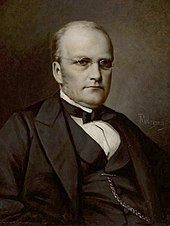Stanisław Moniuszko
show This article may be expanded with text translated from the corresponding article in Polish. (September 2020) Click [show] for important translation instructions. |

Stanisław Moniuszko (Polish pronunciation: [stãˈɲiswaf mɔ̃ˈɲuʃkɔ]; May 5, 1819, Ubiel, Minsk Governorate – June 4, 1872, Warsaw, Congress Poland) was a Polish composer, conductor and teacher. He wrote many popular art songs and operas, and his music is filled with patriotic folk themes of the peoples of the former Polish–Lithuanian Commonwealth (predominantly the Poles, Lithuanians and Belarusians).[1] Since the 1990s Stanisław Moniuszko is being recognized in Belarus as an important figure of Belarusian culture.[2] Moniuszko's operas are regularly performed at the Belarusian National Opera. There is a Museum of Stanisław Moniuszko.[3]

He is generally referred to as "the father of Polish national opera".[4]
Works[]
For a complete list, see List of compositions by Stanisław Moniuszko
Moniuszko's series of twelve song books is notable and contains songs to the words of Adam Mickiewicz, Antoni Edward Odyniec, and Józef Ignacy Kraszewski.
An English version of Straszny dwór (The Haunted Manor, or The Haunted Castle[5]) was created and premiered by the student operatic society at Bristol University in 1970; this version has been performed since, specifically in 2001 by Opera South, which company also presented the world premiere of a specially created new English version of Verbum Nobile in 2002.
Moniuszko's opera Flis (The Raftsman) was performed and recorded in the Wielki Theatre of Polish National Opera at the 2019 Chopin and his Europe International Music Festival, marking the 200th anniversary of Moniuszko's birth.[6]
Paria was performed at Poznań Opera in June 2019, directed by Graham Vick and conducted by Gabriel Chmura.
Halka is an opera by Polish composer Stanisław Moniuszko to a libretto written by Włodzimierz Wolski, a young Warsaw poet with radical social views. It is part of the canon of Polish national operas.
References[]
- ^ Аляксей Хадыка [Alexey Khadyka] (May 22, 2009). "Станіслаў Манюшка — паляк, літвін..." [Stanislaw Moniuszko – Pole and Lithuanian] (in Belarusian). Archived from the original on July 27, 2011. Retrieved January 20, 2013. NovyChas.org, Culture. Retrieved from the Internet Archive, February 18, 2013.
- ^ "Праправнучка Станислава Монюшко: 'В Минске должен появиться памятник композитору' " [Great-great-granddaughter of Stanisław Moniuszko: 'A monument to the composer should appear in Minsk'] by Кастусь Лашкевич [Kastus Lashkevich], 19 Oktober 2009, Tut.By (in Belarusian)
- ^ Stanisław Moniuszko Museum, Belarus
- ^ "Stanisław Moniuszko – Ojciec polskiej opery". poland.us.
- ^ "Opera: Moniuszko's Haunted Castle"; by Bernard Holland, The New York Times, April 23, 1986
- ^ "Festiwal "Chopin i jego Europa"" [Chopin and his Europe]. Fryderyk Chopin Institute (in Polish). 2019. Retrieved August 13, 2020.
External links[]
| Wikimedia Commons has media related to Stanisław Moniuszko. |
- Free scores by Stanisław Moniuszko at the International Music Score Library Project (IMSLP)
- Free scores by Stanisław Moniuszko in the Choral Public Domain Library (ChoralWiki)
- List of works, lieder.net
- "Stanisław Moniuszko", biography, list of works, Polish Music Center, University of Southern California
- How Family Shaped the Father of Polish Opera
- The Lesser Known Faces of Stanisław Moniuszko
- Sound examples and discussion of String Quartet No. 1 and No. 2, editionsilvertrust.com
- 1819 births
- 1872 deaths
- 19th-century classical composers
- 19th-century male conductors (music)
- 19th-century conductors (music)
- 19th-century organists
- Belarusian composers
- Burials at Powązki Cemetery
- Chopin University of Music faculty
- Male conductors (music)
- Male opera composers
- Male organists
- People from Chervyen District
- People from Igumensky Uyezd
- Polish classical composers
- Polish classical organists
- Polish conductors (music)
- Polish male classical composers
- Polish opera composers
- Polish people of Armenian descent
- Polish Romantic composers